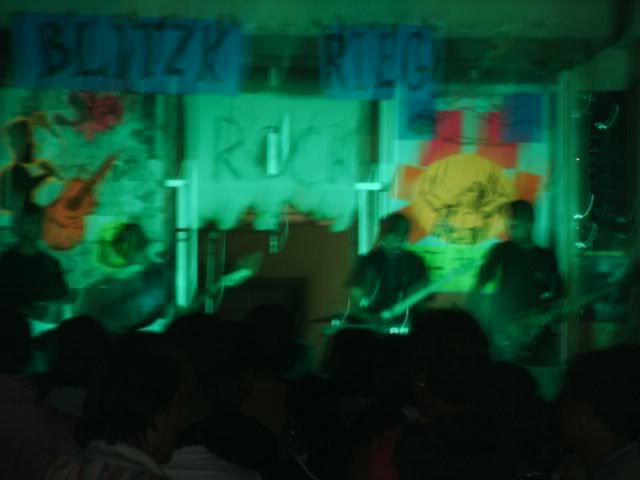Yeah, babay!
This is what happened last weekend.

(thanks to :..M..: for the pic. :-) )
Microtone kicked ass at Expressions, 2005, Nizam College, Hyd. If you weren't there, you missed it babay! But no matter, you will be given another chance.
Microtone will be at Nirvana 2005, MGIT, Hyd - an event which will happen in the second week of March. At last information, Pin Drop Violence (Winners of Great Indian Rock this year) and Zero (winners of the same competition last year) are going to headline the event.
It will be fun.
And innnnnto the weekend we goooooooo!
This one will be taken up largely by cricket practice, band practice, cricket match, band practice. Then I have to decide whether I want to go to Mumbai or Bangalore for the Mark Knopfler concert (5th n 7th March respectively). Mumbai looks better cos it's a Sat nite. However, small problem is that I hate that city. But still yet however I would get to meet some very interesting people, so...
Bangalore is on a Monday nite (-5 for that), but I like that city, I've got some friends there I want to spend some time with. Maybe I can meet some new friends I've made through the blogs...but this means I have to take leave. Wednesday of that week is a holiday, so I could take Mon, Tue off and make it a holiday type (yay). But also however, the Friday of the week is likely to be the Microtone performance, so I'll surely have to take that day off as well.
Which might make taking Thurs and Fri off a better idea. In which case, I can't take Monday off. In which case, I can't goto Bangalore. In which case, it means I'll have to goto Mumbai for the concert. But I hate that city.
FARK!
Damn, I need to make some time for myself.
Too much. Too much...

(thanks to :..M..: for the pic. :-) )
Microtone kicked ass at Expressions, 2005, Nizam College, Hyd. If you weren't there, you missed it babay! But no matter, you will be given another chance.
Microtone will be at Nirvana 2005, MGIT, Hyd - an event which will happen in the second week of March. At last information, Pin Drop Violence (Winners of Great Indian Rock this year) and Zero (winners of the same competition last year) are going to headline the event.
It will be fun.
And innnnnto the weekend we goooooooo!
This one will be taken up largely by cricket practice, band practice, cricket match, band practice. Then I have to decide whether I want to go to Mumbai or Bangalore for the Mark Knopfler concert (5th n 7th March respectively). Mumbai looks better cos it's a Sat nite. However, small problem is that I hate that city. But still yet however I would get to meet some very interesting people, so...
Bangalore is on a Monday nite (-5 for that), but I like that city, I've got some friends there I want to spend some time with. Maybe I can meet some new friends I've made through the blogs...but this means I have to take leave. Wednesday of that week is a holiday, so I could take Mon, Tue off and make it a holiday type (yay). But also however, the Friday of the week is likely to be the Microtone performance, so I'll surely have to take that day off as well.
Which might make taking Thurs and Fri off a better idea. In which case, I can't take Monday off. In which case, I can't goto Bangalore. In which case, it means I'll have to goto Mumbai for the concert. But I hate that city.
FARK!
Damn, I need to make some time for myself.
Too much. Too much...

